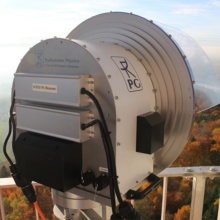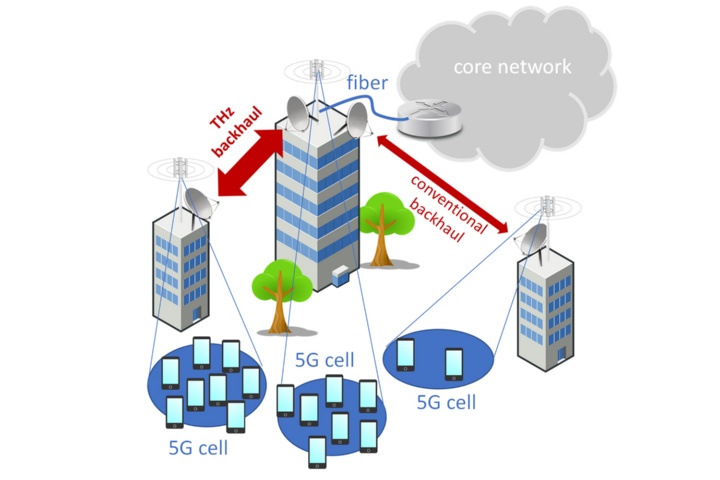The standardization of 5G NR, the first global standard for the next generation of mobile communications 5G, is nearly complete. Data traffic densities of several terabytes per second per square kilometre are being predicted. Connectioning to mobile telephones requires more and more mobile radio cells, each covering only a small area, to offer the requested high data rates to all users. Each of these cells has to be connected via a “backhaul” link to the data network of a mobile service provider. Fibre connections are not always a viable option. In the project “ThoR,” researchers from Europe and Japan, together with manufacturers and operators, meet the challenge to transfer these large amounts of data by means of THz radio links as backhaul into the core network of the mobile service providers.
The ThoR consortium joins leading Japanese and European players from industry, research and development as well as from science, whose preliminary work defines the state-of-the-art in terahertz communications. Technische Universität Braunschweig in Germany and Waseda University in Japan will jointly coordinate the project, which plans not only to develop and investigate technical solutions for backhauling and fronthauling but also to carry out demonstrations in a real environment. Within THoR, the University of Stuttgart is responsible for the conception and design of the integrated Terahertz transmit and receive circuits and is involved in the planning and realisation of the data transmission experiments.
The frequency spectrum below 275 GHz is used intensively and the possibilities to enhance the transfer rates are becoming more and more complex due to limited available bandwidth. Recently, progress in semiconductor technology has made communication systems beyond 275 GHz possible. The THz frequency range between 300 GHz and 3 THz offers huge bandwidths of several tens of GHz as long as the so-called passive services like earth observation and radio astronomy are not disturbed by interference.
Thus a major ThoR sub-project investigates the compatibility with these passive services. The results have some influence on the preparations for the World Radio Conference in Sharm el-Sheikh, Egypt, in October 2019. Already in 2017, IEEE 802, a project group of the Institute of Electrical and Electronics Engineers, passed the first standard for THz communication (IEEE 802.15.3d “100 Gbps Wireless Switched Point-to-Point Physical Layer”) with major contributions from Germany and Japan.
Currently the wireless backhaul solutions planned for 5G achieve only up to 10 Gbps. With the set-up of a THz radio link, the ThoR project realises for the first time both the enormously high real-time transfer rates of up to 100 Gbps and the implementation of the new IEEE standard for a backhaul or fronthaul system. A highlight at the end of the project will be the demonstration of the radio link transporting real data.
The technology partners contribute state-of-the-art chip sets and modems as well as additional components to the radio link. ThoR will apply European and Japanese state-of-the-art photonic and electronic technologies to build a transceiver with an extremely high bandwidth and a high dynamic range, working at 300 GHz, combined with state-of-the-art digital signal processing units.
The ThoR project has received funding from Horizon 2020, the European Union’s Framework Programme for Research and Innovation, under grant agreement No. 814523. ThoR has also received funding from the National Institute of Information and Communications Technology in Japan (NICT). The total project cost is three million Euros. The project started on 1 July 2018 and ends on 30 June 2021.
Partners in the ThoR Project:
Technische Universität Braunschweig (EU coordinator, Germany), Waseda University (Japan coordinator, Japan), Chiba Institute of Technology (Japan), Gifu University (Japan), Universität Stuttgart (Germany), Fraunhofer-Institut für Angewandte Festkörperphysik IAF (Germany), University of Lille (France), HRCP (Japan), Vivid Components Ltd. (UK), Siklu Communication Ltd. (Israel), NEC Corporation (Japan) und Deutsche Telekom (Germany / Czech Republic).
Expert Contact:
Prof. Ingmar Kallfass, Universität Stuttgart, Tel: +49 (0)711-685-68747, E-Mail



